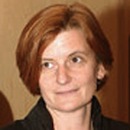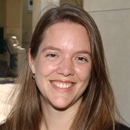Academic Editors
The following people constitute the Editorial Board of Academic Editors for PeerJ. These active academics are the Editors who seek peer reviewers, evaluate their responses, and make editorial decisions on each submission to the journal. Learn more about becoming an Editor.

Rob Russell
Co-director of Bioquant and Professor of Protein Evolution at Heidelberg University. Previously Group Leader at EMBL, Heidelberg, Academic Editor at FEBS Letters at PLoS Computational Biology.

Zijing Zhou
Dr. Zijing Zhou is an Assistant Professor in the Department of Respiratory and Critical Care Medicine, Second Xiangya Hospital of Central South University.
Her primary research focus is on COPD, Asthma and allergic disorders, Lung cancer, Infectious, Rare and Idiopathic Pulmonary Diseases. She has more than 2 years basic research training in Dr Yong Zhou’s Lab (http://scholars.uab.edu/display/yzhou), Pulmonary, Allergy, & Critical Care Medicine, Department of Medicine, University of Alabama at Birmingham, USA.
Dr. Zhou's research projects focus on mechanotransduction in lung fibrosis and endothelial dysfunction in COPD.

John H Challis
Prof. John H. Challis Ph.D. is a Professor of Kinesiology at Pennsylvania State University in the Department of Kinesiology. His research focuses on biomechanics, and the coordination and function of the musculo-skeletal system, with specializations in the following areas:
- Measurement and simulation modeling of the human musculo-skeletal system
- Examination of human segmental inertial properties
- Development of improved biomechanical measurement protocols

Julie D. Thompson
Until 2013, Senior research scientist at the Institute of Genetics and Molecular and Cellular Biology and University of Strasbourg, France. Currently, senior research scientist in Integrative Bioinformatics and Genomics at the ICube laboratory and University of Strasbourg, France.

Don C Rojas
Professor of Cognitive Neuroscience
Chair, Department of Psychology
The main focus of my research endeavors is sensory and motor processing in neurodevelopmental disorders such as autism and childhood onset schizophrenia. A major theme in my work has been the identification of heritable biomarkers in autism, using non-invasive neuroimaging and electrophysiological techniques in first-degree relatives. Recent work has focused on auditory temporal processing and gamma-band timing deficits as well as magnetic resonance spectroscopy of amino acid neurotransmitter systems associated with gamma-band oscillations. I am also affiliated with the Magnetoencephalography (MEG) Laboratory and Brain Imaging Center at the University of Colorado Anschutz Medical Campus and have expertise in several brain-imaging methods, primarily MEG, but also including structural MRI, fMRI and MR spectroscopy. Current research at CSU involves EEG and functional near infrared spectroscopy (fNIRS) to examine the coupling of electrophysiology and hemodynamics in sensory and motor systems.

Sarah F. Brosnan
I study the evolution of decision-making and economic behavior across the primate Order. I am particularly interested in how non-human primates make decisions, especially about cooperation, and how they are altered based on social and ecological contexts.
I am currently an Assistant Professor of Psychology, Philosophy & Neuroscience at Georgia State University and direct the Laboratory for Comparative Economic & Behavioral Studies. I am on the editorial board of several open access journals.

Kalliope K Papadopoulou
Kalliope K. Papadopoulou is a Professor in Plant Biotechnology at the Department of Biochemistry and Biotechnology, Laboratory of Plant and Environmental Biotechnology, University of Thessaly. She has a first degree in Biology, Aristotle University of Thessaloniki and a PhD in Plant Molecular Biology from the Department of Agricultural Biotechnology, Agricultural University of Athens.
Her main research interests are in plant-microbe interactions, with emphasis on: the molecular basis of symbiotic interactions of plants with soil microorganisms, including multi-partite interactions, and their effect on plant responses to abiotic and biotic stresses; She also has long term experience in plant specialized metabolis (biosynthesis, production in heterologous systems, metabolic engineering in plant systems), focusing lately on the functional roles of plant natural products in beneficial rhizosphere interactions.

Jianjun Zhang
Professor at the School of Land Science and Technology, China University of Geosciences (Beijing).
I work on land use and sustainability, ecological modeling, land economics and regional planning, low-carbon land use and ecosystem services in human disturbance zones, urban management. The focus of my current research has been expanded to green infrastructures, ecologic economics and heat island effects related with land use.
Sabine Leonhard-Marek
Veterinarian TiHo Hannover, research assistant Veterinary Physiology Free University Berlin (Dr. med.vet.), Associate professor of physiology, University of Veterinary Medicine Hannover, M.A. LIS Humboldt University Berlin, Director of the university library, University of Veterinary Medicine Hannover

Heike Folsch
Research Associate Professor at the Northwestern University, Feinberg School of Medicine, Department of Cell and Developmental Biology. Research fields include the investigation of membrane trafficking in polarized epithelial cells.

Krishna Dev Oruganty
I can best describe myself as a simulation biologist. I am interested in simulating life processes at multiple scales. From the atomic scale to understand protein function to cellular or systems scale to understand physiological processes. My main tool is the computer which I use to analyze, understand and predict biology. Secondary tools are in vitro biochemistry and biophysics experiments that I use to validate my predictions.

Arindam Mitra
Dr. Arindam Mitra is a Professor of Microbiology with a specialization in Molecular Biology and Microbiology. He received his Ph.D. from the University of Maryland, College Park, Maryland, USA. After his doctoral studies, Dr. Mitra also worked as a postdoctoral researcher at the Arizona State University, Tempe, USA.
Dr. Mitra's research area includes microbial pathogenesis, biofilms, and vaccine development. Currently, he examines the development and regulation of biofilms in natural, industrial, and clinical settings.
He serves as a reviewer for several peer-reviewed scientific journals such as Food Research International, Access Microbiology, Journal of Medical Microbiology, Frontiers in Immunology, Frontiers in Microbiology, and many others. Dr. Mitra also serves as an editor for Access Microbiology, Microbiology Today, Canadian Journal of Infectious Diseases and Medical Microbiology, and Peer J Life and Environment.

